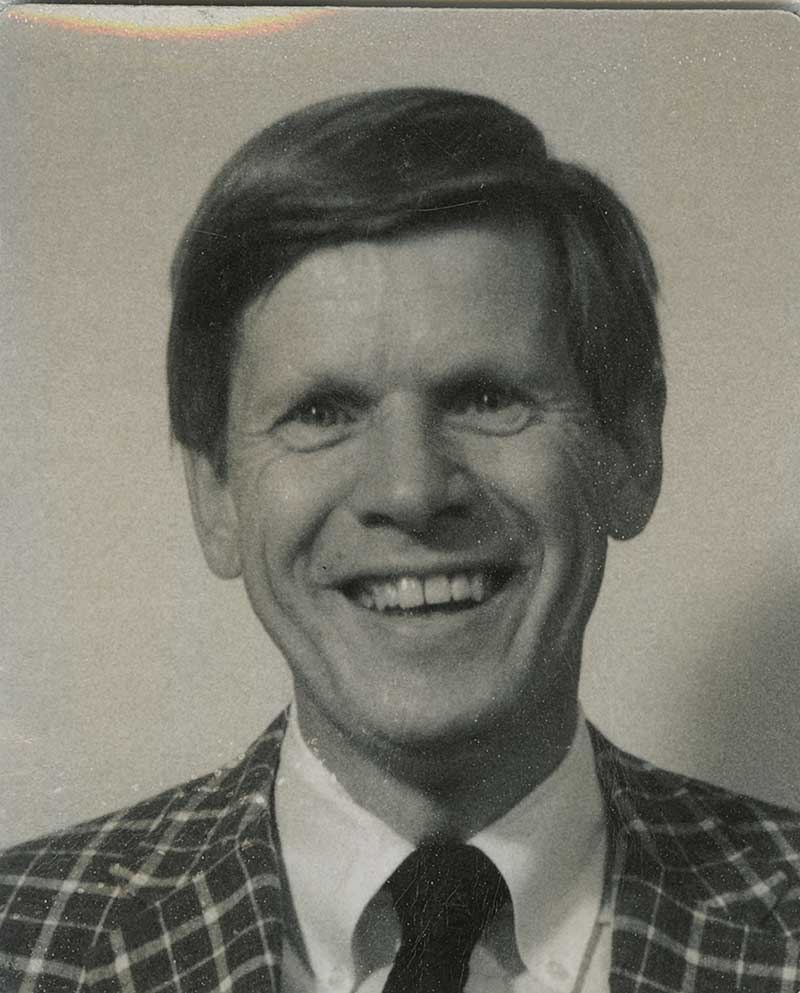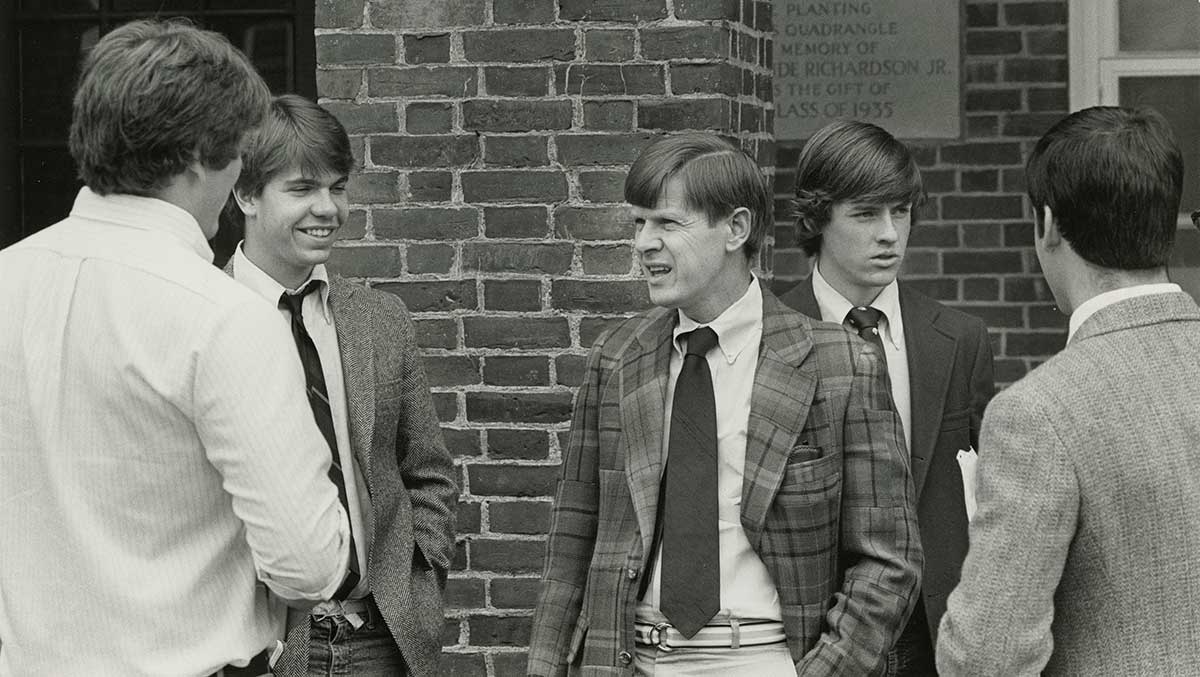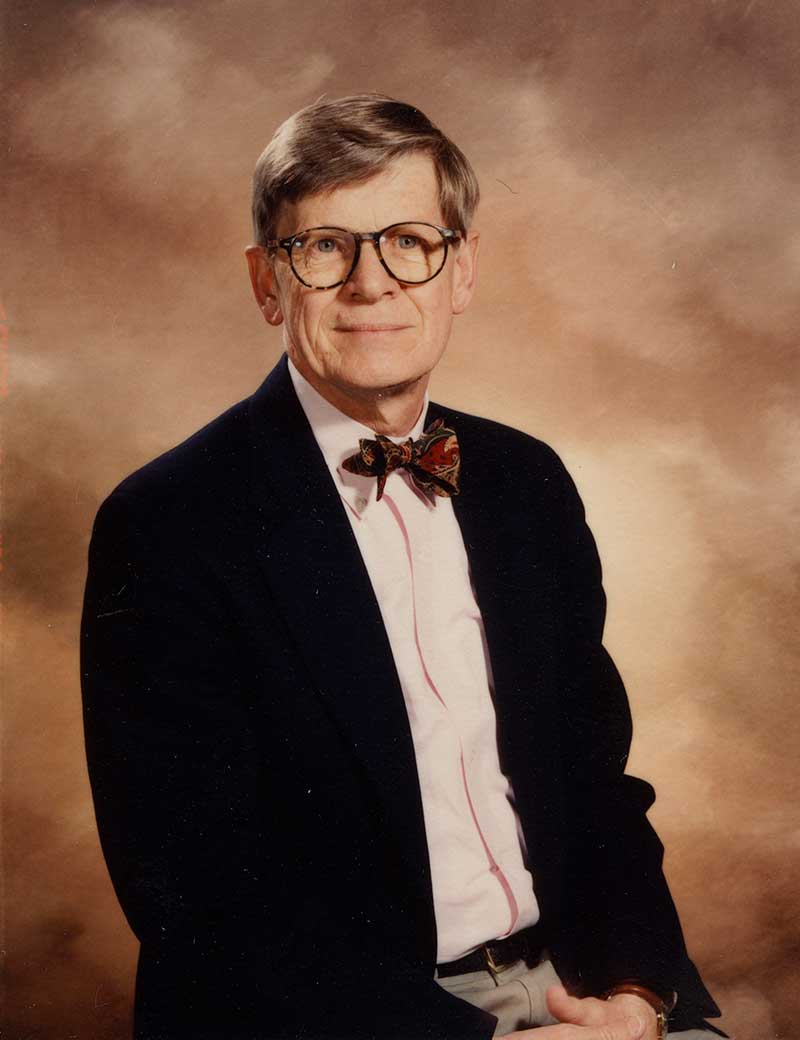HARVARD VAUGHAN KNOWLES ’77, ’78, ’84, ’02, ’03 (Hon.)
1935-2022
 Chair of the Department of English, Thomas S. and Elinor B. Lamont Professor of English, Emeritus
Chair of the Department of English, Thomas S. and Elinor B. Lamont Professor of English, Emeritus
These remarks were presented to the faculty at its meeting of Sept. 26, 2022.
Harvard Vaughan Knowles was born on March 11, 1935, in Newport, Maine, one of seven children, to Elbert and Bertie Knowles. After his graduation from Skowhegan High School, he enrolled at Tufts University, where he graduated in 1958 with a BA in English. From 1958 to 1960, he served as a clerk filing papers for the United States Army at Fort Gordon, Augusta, Georgia, an experience for which he was later grateful; it exposed him to a diverse group of people, he said, and taught him military discipline (he also joked about all the Purple Hearts he acquired from paper cuts). His first teaching position was at Loomis-Chaffee School in Windsor, Connecticut (1962-1974), where he taught English and served as Department Chair. He somehow found the time for graduate school and earned his MA in English from Duke University in 1968. His passion was Shakespeare, and his thesis focused on the Bard’s plays.
In 1974, Harv joined the Exeter faculty as Instructor in English where he quickly became a favorite among students. Always dapper, he was a preppy dresser in his tweed jackets, colorful shirts and stylish bow ties. “Only in his mid-30’s when he taught us,” recalled one student from that time (Morgan Dudley, PEA 1977), “he had a timeless wisdom that held within it some comfort for our future.” Mr. Knowles was invited to be the speaker at the senior dinner for the Class of 1977 (he would later become that class’s only honorary member). His eloquent and wise remarks, excerpted here, were reprinted in full in The Exeter Bulletin.
I hope you’ll be able to say that for a brief moment in your life you were a part of a place that cared enough about you to make you unhappy with anything but your best. If you’ve felt uncomfortable at times, I hope it’s because you’ve been forced to stand on your own intellectual feet. And if you’ve been challenged, I hope it’s because you’ve been forced to reach inside yourself and bring out of the depths of your consciousness, and sometimes even your unconscious, ideas, feelings, and attitudes you never had any inkling you had or even thought you were capable of having. Education does not impose, it elicits. It makes you the agent of your own illumination . . . It requires that you be responsible enough to perceive the nuances of others’ thinking not only so you can measure your own against it but also so you can find in other people a fellowship you can relish. It demands that you plumb the depths of your being so that you can find out possible ways for you to be, even if that means you must turn your back on football in the face of your father’s desire that you relive his experience on the gridiron or that you must be a draftsman even though the world seems to respect only architects. How could we expect any of this to be easy? How could we respect teachers and a school who tried to make it so? Like all things worth pursuing, education leads at last to a paradox: you must lose yourself to find yourself. Perhaps you have to lose yourself in the tedium and often the sheer drudgery of learning so that you can at last find the intellectual patterns that will give line and shape and design to your life.
The young teacher whose rural forebears had named him (with perhaps aspiring hope?) Harvard also had this to say that evening to the outbound seniors:
I have to point out that one of the most difficult lessons to learn here is that education is not the exclusive province of a small group of prestigious Eastern colleges nor does it end with the certification to practice a profession. Being good and being thoughtful are not functions of geography nor do they come automatically with impeccable credentials. Cambridge, Massachusetts, was once a wilderness, and the room in Phillips Hall where I labor to plant ideas is built on what was once an open field where my ancestors planted their turnips. I will leave it for you to decide which crop was more effectively fertilized.
“Mr. Knowles was simply the best teacher I ever had, anywhere,” says one of his students from that time, Morgan Dudley, now Exeter’s Director of Institutional Advancement. “The twinkle in his eye and his coiled energy—holding back to allow the Harkness conversation to unfold, listening intently, enjoying the exchanges, encouraging, prodding, delighting. ‘Yes,’ he would say, pointing his finger at you in confirmation, making you feel you had been singled out for extraordinary brilliance for one brief, shining moment, ‘Now you’re cooking with gas!’”

Nor did Harv’s care for students stop at the classroom. Eimer Page tells of a former student, Wolff Klabin, who recounted how Harv spent endless hours with him in the dorm when he arrived at Exeter as a homesick and under confident new student from Brazil. Harv helped him translate all of his reading to English night after night until Wolff gained the confidence to work without his scaffolding. Years later, when Institutional Advancement was planning a Brazil visit, Wolff insisted that Harv come along. This led to some charming photos of Harv grinning in rolled-up chinos and carefully pressed shirt, with his bare toes in the sand of Copacabana Beach.
At Exeter, Harv served as Chair of the English Department from 1983-1988 and as resident faculty in Webster, Browning and Wentworth; he was affiliated with Dow House, Cilley and Ewald South and taught Indoor Fitness. Additionally, he served as a part-time admissions officer and as a member of the Executive Committee, the Appointments and Leaves Committee, the Compensation Advisory Committee, the Communications Committee and was a judge for the Merrill Prize. He was director of the Washington Intern Program and was advisor to The Exonian and The Writer’s Market Club.
From his first-floor classroom in Phillips Hall, Harv taught the big guns, and his canon was unapologetically WASPish: Shakespeare’s Hamlet, Hemingway’s For Whom the Bell Tolls and Melville’s Moby Dick. But his sensibilities and sympathies were with his students from every quarter. A colleague (Becky Moore) remembers: “He would remind us that ‘It is not my Moby Dick—it is their Moby Dick.’ His phrase summed up student-centered learning at the table, and always reminded me to park my ego at the door as I came to class, trying to be ready to listen for student interest and discovery.” As Harv himself wrote in 1971, outlining his teaching philosophy:
The teacher who cares doesn’t imprison his students in his system or bind them to his ideas of what they ought to be. On the contrary, he seeks to free them to be themselves, to develop in themselves what is unique. The good and loving teacher cherishes what is different in each person and never sees him as part of the mass.
To a young colleague whom he was mentoring, he wrote:
Enabling students to see each other as resources is one of the goals of Harkness teaching. The more explicit a teacher’s authority is, the more likely it is that the class will be content with the “right” answer, with the teacher’s declaration, with the summarizing certainty that discourages inquiry. The more students do in class, the better off they will be in a class. Your students . . . confirmed but once again to me the truth of that assertion . . . Never do for students what students can do for themselves.
Even during retirement, Harv was the indefatigable instructor, teaching several summer programs on Moby Dick for Exeter faculty and alumni/ae at the Mystic Seaport Workshop.
He traveled widely in the United States, Europe, Africa, elsewhere. His longtime friend Mark Ott writes, “I first met Harv in 1997 at a Hemingway conference in Cuba, and it was there that he suggested that I apply to PEA for teaching position. Harv and Nita [Pettigrew] were wonderful friends to Lori (my wife) and me, and we enjoyed countless dinners out in Portsmouth and Boston. Harv and I traveled to Hemingway conferences in Italy, Spain, Oak Park, Boston, and we even made the pilgrimage to Rye to pay tribute to Henry James. He also visited the Otts in Minneapolis (twice) while I was teaching at The Blake School, and in Hawaii, while I was teaching at Punahou, and many times when we were in Deerfield. He had promised to visit us here in the Bahamas, but then COVID struck.”
In 1989, Harv was appointed Thomas S. and Elinor B. Lamont Professor of English. He was twice recipient of the Brown Family Award for Excellence in Teaching and received both The Teaching Award from the Harvard Club of Boston (1995) and an Outstanding Teacher Award from the United States Department of Education (1999); he was honored as the Klingenstein Fellow at Columbia University (1978-1979). In 2003, the HARVARD V. KNOWLES BOOK FUND was established by the grateful parent of a recent postgraduate “to recognize and honor Mr. Knowles” and to purchase materials “in the realm of English” for the Class of 1945 Academy Library. In Harv’s 25-year citation, then Dean of Faculty Jack Herney wrote:
Your numerous teaching awards and commendations from colleges prompted by your former students attest to the high regard Exeter alums have for the quality of your teaching and the impact you’ve made on their lives. Yet, such accolades stem from more than superior Harkness technique. Our students are perceptive and surely those Exonians who pay you compliments recognize at some level that their passion for learning has been inspired by your own and that you live your own life as you would have them live theirs. As an example to them your Fellowship for Independent Study and your NEH grants involving weeks of reading, discussion and writing have taken you far from Exeter to study Melville and Moby Dick, and Thucydides, and Andre Malraux, demonstrating your belief that teachers must always be engaged in learning.
To this Jack added, “Moreover, we suspect our intuitive Exonians also recognize that your teaching and your career has a moral center to it. ‘The teacher of French,’ you have said, ‘may have a greater moral impact on a student than does Racine or Camus’ and ‘how we live is our greatest concern as educators.’” Harv addressed the subject at length in his essay “A Paper from the Institute,” laying out the great moral burden and charge we have as educators:
Because we are in a boarding school we must be willing to be responsive not only to the intellectual needs of our students but to their emotional and moral ones as well. We must take seriously the charge of nurturing implicit in the concept and organization of the residential school. We must be open, generous, responsive and affectionate. We must be patient and long suffering enough to stay with students through their struggle with themselves, and often even with us, and help them find ways of being comfortable with that emerging self which in the first flush of discovery can be terrifying in its novelty. We must respect our students’ wholeness, not fragmenting it to deal solely with their heads. Rather, we must discipline ourselves to see them as individuals, to be comfortable with them as growing people that they might learn to be comfortable with themselves.
The theme of moral-centered teaching also featured in the 1978 essay Harv co-authored with David Weber, titled “The School Community as a Moral Environment”—according to Herney, a “classic treatment on how one should behave as a teacher of children and young adults.” A school, the authors contend, must always provide two things: “high academic standards . . . [and] humane or moral values [such] as compassion, fairness, and courage.” (On a related topic, Harv wrote, “The pursuit of academic excellence is pretty hollow if it is not informed with the awareness that a good mind in and of itself carries no moral value.”) An academic setting should provide a nurturing environment that will not only create well- educated citizens and potential future leaders, but will equip students with the capacity for “generosity of spirit and principled decision-making” as they learn the most important lesson of life (which is, according to Knowles and Weber): “how to live with one another.” It is a pedagogy founded on respect, compassion, sensitivity, kindness—ultimately, on love. In Harv’s own words:
[A] fleeting glance at even a tentative teaching experience will confirm the need for a loving relationship between teacher and taught . . . For the failure to love [one’s students] is a failure to consider them as individuals. And until each one of them is an individual person in the teacher’s mind, he will not be able to help him grow in the way in which his individuality demands.
 In his eulogy for Harv delivered last spring, his close friend and former student Bryan Rigg noted how “Harv often talked about how grateful he was to have lived to be 87 years of age.He said that he outlived both his mother and father by many years and considered his life rich and full of friends and family.” When asked if he was ever sad that he never had children, Harv countered, “But I have had children. Thousands of them. And all from my classroom.” One of his “children” wrote recently of Harv: “I am crying as I write this, grateful to have had the chance a couple of years ago to tell him how much he meant to me. Every member of the Exeter faculty should know through his example what an impact they can have, a lifelong impact. I will never forget him” (Morgan Dudley). Another of Harv’s Phillips-Hall “children,” Bryan Rigg, actually became in later years Harv’s legally adopted son. Through Bryan, we have some of the master teacher’s final words, which I share now with you, his friends and former colleagues:
In his eulogy for Harv delivered last spring, his close friend and former student Bryan Rigg noted how “Harv often talked about how grateful he was to have lived to be 87 years of age.He said that he outlived both his mother and father by many years and considered his life rich and full of friends and family.” When asked if he was ever sad that he never had children, Harv countered, “But I have had children. Thousands of them. And all from my classroom.” One of his “children” wrote recently of Harv: “I am crying as I write this, grateful to have had the chance a couple of years ago to tell him how much he meant to me. Every member of the Exeter faculty should know through his example what an impact they can have, a lifelong impact. I will never forget him” (Morgan Dudley). Another of Harv’s Phillips-Hall “children,” Bryan Rigg, actually became in later years Harv’s legally adopted son. Through Bryan, we have some of the master teacher’s final words, which I share now with you, his friends and former colleagues:
As you may know, over the past year, I have experienced increasing difficulty with memory and speech issues. These issues have become more acute, so that now I also have lost the ability to write anything other than my name. I read with increasing difficulty and retain little of what I do read. Thus, the capacities on which I built a most fruitful and fulfilling life have now all but left me. Stated simply, I am becoming who I am not . . . My loved ones and dear friends, please know how much you have meant to me over the many years. The generosity, kindness, good humor and spirited engagement of colleagues, family members and friends have enriched my life immeasurably. You have been a part of that and I thank you for it . . . Please do not mourn for me. When I die, I will undertake that last journey with a full and happy heart, filled with enormous gratitude for having lived a rich and rewarding life. Live well. Love much. Read plenty and smile always. When you drink a glass of Johnnie Walker Scotch, think of me—and don’t spoil it by putting ice in it.
Harvard Knowles died peacefully in his sleep on March 24, 2022. He is survived by his sister Marlene Dubay; his adopted son, Bryan Rigg, and godson, Justin; several nieces and nephews; and his thousands of students, for whom he lives as inspiration and noble example. Indeed, to the mind of the present writer, there is no one who more fully exemplifies the type of teacher and lifetime learner than Harvard Knowles. In Chaucer’s summary line from The Canterbury Tales, written of his own faithful Clerk:
And gladly wolde he lerne, and gladly teche.
With gratitude to Jack Herney for his good counsel and contributions, and to Harv’s former students and colleagues for the use of their words. I move that this Memorial Minute be submitted to Harv’s sister, Marlene Dubay, and be spread upon the minutes of the faculty.
Respectfully submitted,
Todd Hearon
